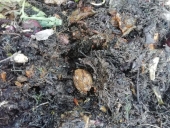
 4
4




 3
3




 4
4




Paula said, "I had planned to line the bin with chicken wire - will this work well enough to prevent rodents getting in about? Should I line with something else also? (? something that will allow worms through...?)
Invasive plants are Earth's way of insisting we notice her medicines. Stephen Herrod Buhner
Everyone learns what works by learning what doesn't work. Stephen Herrod Buhner
 4
4




"All we have to decide is what to do with the time that is given us." ~ Tolkien
 4
4




A build too cool to miss:Mike's GreenhouseA great example:Joseph's Garden
All the soil info you'll ever need:
Redhawk's excellent soil-building series





 4
4




Fish heads fish heads roly poly fish heads
 6
6




Visit Redhawk's soil series: https://permies.com/wiki/redhawk-soil
How permies.com works: https://permies.com/wiki/34193/permies-works-links-threads
 2
2




Jay Angler wrote:
I like the idea of putting a bunch of high-carbon material at the bottom - wood chips, straw, dead leaves - to soak up whatever goodness comes out of the decomposing material - it isn't just a concern of leaching pathogens as Benedict implied regarding Jenkins' practices - veggie leachate is good stuff and we want to hold onto it!
A build too cool to miss:Mike's GreenhouseA great example:Joseph's Garden
All the soil info you'll ever need:
Redhawk's excellent soil-building series









Jay Angler wrote:
the whole idea is to move them to new spots and let the last of the compost turn into a garden plot. In fact last year, I didn't remove the pallets, I just grew zucchini and winter squash in two of them right where they sat! The picture was taken in the spring before planting
"All we have to decide is what to do with the time that is given us." ~ Tolkien




I know people are already aware, but just a gentle reminder that charcoal is excellent to use in compost for that very reason. You end up with better compost, lots more worms, and biochar. Hard to beat that.
Visit Redhawk's soil series: https://permies.com/wiki/redhawk-soil
How permies.com works: https://permies.com/wiki/34193/permies-works-links-threads




I want to be 15 again …so I can ruin my life differently.

|
I yam what I yam and that's all that I yam - the great philosopher Popeye. Tiny ad:
Regionally adapted Midwest Seeds for the rest of US
http://flyoverseeds.com
|



